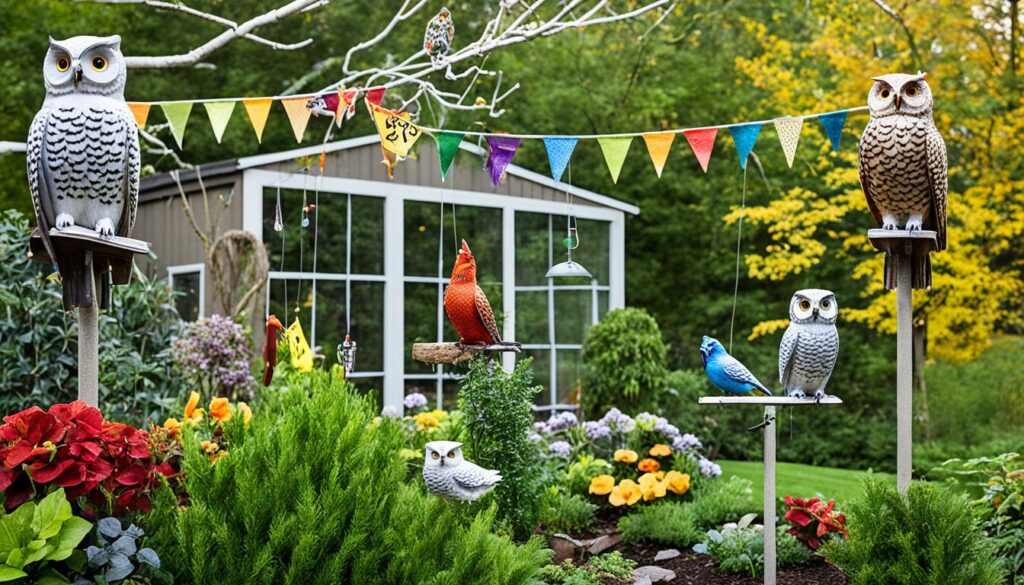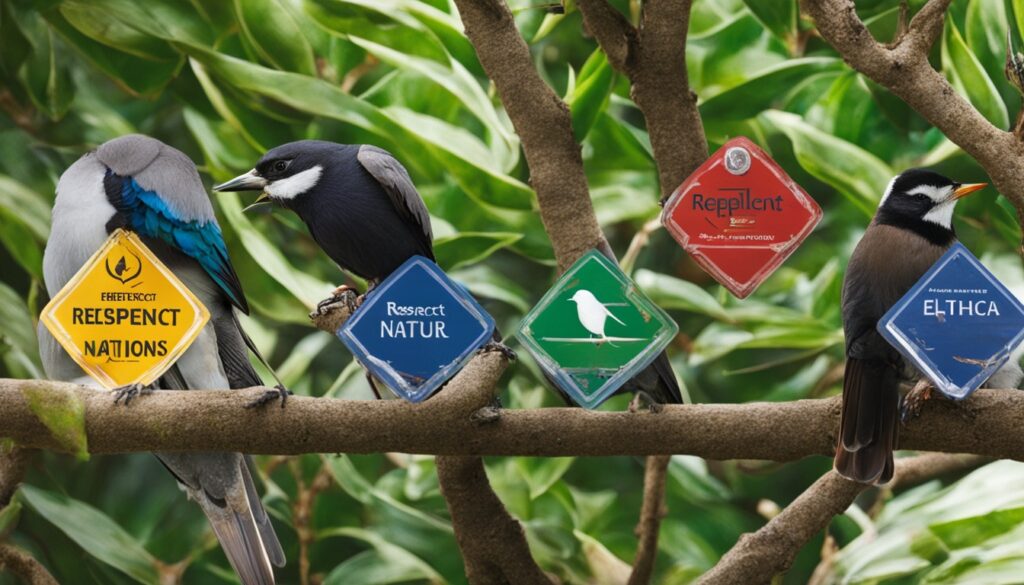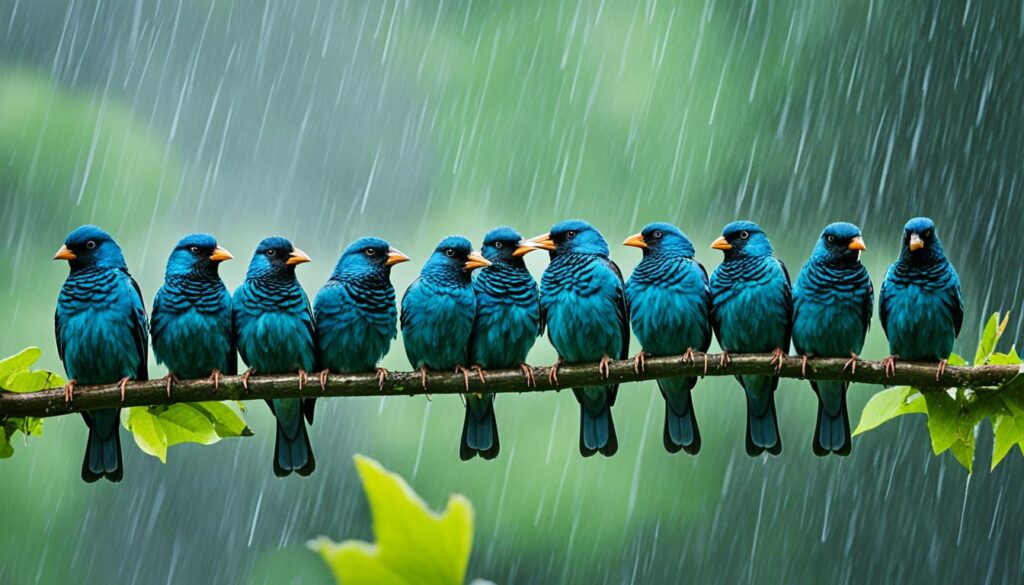Did you know that birds chirp near windows due to the presence of trees, potential nesting sites, or reflections on the glass that attract them? This unexpected fact highlights the scale of the issue, as their persistent vocalizations can disrupt your peace and quiet, especially during the early morning hours. If you’ve been struggling to get a good night’s sleep due to the incessant chirping of birds, fear not – this comprehensive guide will provide you with effective solutions to stop birds from chirping and restore the tranquility in your home.
Key Takeaways
- Understand the reasons behind bird chirping and their early morning chorus
- Discover practical methods to deter birds from your property and reduce avian noise
- Learn about soundproofing techniques to minimize the impact of bird sounds
- Explore humane and ethical ways to create alternative habitats for birds
- Collaborate with your neighbors to address persistent bird noise issues
Understanding Why Birds Chirp
Have you ever wondered why birds chirp so much, especially in the early morning hours? Their vocalizations are an integral part of their behavior and communication, serving various purposes in the avian world. By understanding the reasons behind bird chirping, we can gain insights into their fascinating lives and behaviors.
The Early Morning Chorus
One of the most common reasons for the early morning bird chorus is the need to establish and defend their territory. As the day begins, male birds start singing to mark their claims and ward off potential competitors. This vocal display helps them assert dominance and communicate with their neighbors, ensuring a peaceful coexistence within their respective territories.
Mating Calls and Territory Defense
In addition to territorial marking, bird chirping also plays a crucial role in the mating process. Male birds use their distinctive songs to attract potential mates and advertise their desirability. The complexity and volume of their vocalizations can indicate the health, strength, and overall quality of the individual bird, making them more attractive to females.
Furthermore, bird chirping serves as a means of defense against intruders. When a bird perceives a threat to its territory, it will engage in a vocal exchange to assert its dominance and warn off the trespasser. This behavior helps maintain the balance within the bird community and ensures that each individual has access to the resources it needs to thrive.
“The dawn chorus is a captivating display of bird communication, with each species contributing its unique voice to the symphonic harmony of the natural world.”
Understanding the reasons behind bird chirping, from the early morning dawn chorus to the mating calls and territorial defense, can enhance our appreciation for the intricate behaviors and adaptations of these feathered creatures. By observing and learning about the various functions of bird vocalizations, we can gain a deeper understanding of the avian world and the important role these animals play in the delicate balance of our ecosystems.
How to Get Birds to Stop Chirping
If the persistent bird chirping is disrupting your peace and quiet, there are several effective methods you can try to get the birds to stop. Start with some simple, kid-friendly solutions before exploring more aggressive deterrents.
Kid-Friendly Tips for Reducing Bird Noise
One of the easiest ways to discourage birds from chirping around your home is to close your windows, especially during the early morning hours when the birds are most vocal. You can also try moving any bird feeders or baths further away from your house to encourage the birds to stay in their designated feeding areas.
Another effective kid-safe option is to hang reflective objects like wind chimes or window decals near the areas where the birds tend to perch. The movement and glare from these items can deter the birds from landing and chirping in those spots.
Deterring Birds from Your Property
For a more proactive approach, you can try installing ultrasonic bird deterrents or using chemical repellents around your property. These humane methods emit high-frequency sounds or unpleasant scents that encourage the birds to steer clear of your home without harming them.
You can also try covering any areas that the birds are pecking or nesting in with bird netting, chicken wire, or other physical barriers to restrict their access. Providing an alternative bird house or roosting spot can also help divert their attention away from your home.

Remember, it’s important to approach bird control in a humane and responsible manner, as many species are protected under laws like the Migratory Bird Treaty Act. With a little creativity and persistence, you can find effective ways to reduce the bird chirping around your home without causing harm to the feathered friends.
Soundproofing Techniques
If the chirping of birds outside your home is still audible despite your efforts to deter them, it may be time to consider implementing some soundproofing measures. Upgrading your window treatments and improving insulation can help muffle the sound of avian sounds, creating a more peaceful indoor environment.
Window Treatments and Insulation
Heavy curtains or drapes can be an effective way to block the noise of chirping birds from entering your home. Look for curtains made of thick, sound-absorbing materials like velvet or blackout fabric. Additionally, installing double-cell shades or sound-dampening curtains can further reduce the transmission of bird chirps.
Improving the insulation in your home can also make a significant difference in muffling outdoor bird noises. Consider adding extra insulation to walls, attics, and other areas to create a more soundproof barrier against avian sounds. This can include using materials like acoustic panels, mass-loaded vinyl, or even simple weatherstripping around windows and doors.
Soundproof window inserts are another option to consider. These custom-made inserts can be installed over your existing windows, providing an additional layer of noise reduction. Typically, soundproof window inserts can offer noise reduction benefits between 48 and 54 Sound Transmission Class (STC), a significant improvement over single-pane windows.
For a more comprehensive solution, you may also want to consider upgrading to double-pane windows. These windows can have an STC between 26 and 35, providing better soundproofing compared to single-pane windows. The cost of replacing windows can range from $350 to $900 per window, but the investment can be worthwhile for those seeking a quieter indoor environment.
Remember, soundproofing your home against bird noise requires a multifaceted approach. By combining window treatments, insulation, and other soundproofing techniques, you can create a more peaceful living space and reduce the impact of unwanted avian sounds.
Creating Alternative Habitats
One effective strategy to reduce bird chirping near your home is to create alternative habitats that draw the birds away from your property. By providing the birds with other attractive areas to congregate, you can encourage them to vocalize elsewhere, away from your living spaces.
Start by planting trees or shrubs in locations farther from your home. These new nesting and perching spots will give the birds an alternative space to gather and communicate. Additionally, setting up birdbaths and feeders in a more distant area can lure the birds to that location, drawing their attention away from your windows and outdoor areas.
- Utilize providing alternative bird habitats by planting trees and shrubs away from your home.
- Install bird feeders and baths in areas farther from your living spaces.
- Encourage the birds to relocate their nesting sites to these alternative locations.
By carefully landscaping for bird deterrence, you can create a win-win situation – the birds have a new, suitable habitat, and your home remains relatively free from their persistent chirping. This approach allows for coexistence while minimizing the impact of bird activities on your daily life.
“Creating alternative habitats is a humane and effective way to manage bird chirping near your home. By providing the birds with other attractive options, you can guide them away from your living spaces without harming them.”

Remember, a multi-faceted approach that combines various bird deterrence methods is often the most successful strategy. By employing a combination of providing alternative bird habitats, relocating bird nesting sites, and landscaping for bird deterrence, you can effectively reduce the prevalence of bird chirping around your home while maintaining a healthy, natural environment.
how to get birds to stop chirping
Dealing with persistent bird chirping can be a frustrating experience, but there are several effective methods you can use to reduce avian vocalizations and regain a peaceful environment. From simple home remedies to more advanced deterrents, this guide covers a wide range of techniques to help you stop birds from chirping.
Understanding the reasons behind bird chirping is the first step in addressing the issue. Birds often chirp to communicate, defend their territory, or attract mates. By addressing the underlying causes, you can effectively minimize the noise levels in your area.
Practical Tips to Silence Chirping Birds
- Install physical barriers, such as netting or coiled wire, to prevent birds from perching near your home. This can be an effective way to deter them from nesting and vocalizing in your space.
- Use sound-masking devices, like white noise machines, to help cover up the sound of bird chirping. These devices create a consistent background noise that can make the bird sounds less noticeable.
- Plant fragrant herbs and flowers, such as marigolds, garlic, or chrysanthemums, around your property. The strong scents can deter birds from visiting and chirping in your yard.
- Hang visual deterrents, like silhouettes of birds of prey, to scare off smaller birds that may be the source of the chirping.
Remember, it’s important to consider the ethical and legal implications of any bird deterrent methods you choose to employ. Consult with local authorities and wildlife experts to ensure your approach is humane and complies with relevant regulations.
“The key to effectively reducing bird chirping is to understand the underlying causes and employ a combination of deterrents tailored to your specific situation.”
By implementing a multifaceted approach, you can find the right balance between maintaining a peaceful environment and respecting the natural habitat of our feathered friends. With patience and persistence, you can successfully reduce the impact of bird chirping and enjoy a quieter, more serene outdoor space.
Ethical Considerations
When dealing with the issue of bird chirping, it’s crucial to approach the situation with ethical considerations in mind. Responsible avian management requires a careful balance between effectively addressing the problem and ensuring the safety and well-being of the birds.
Humane Bird Control Methods
Avoid methods that could potentially harm or endanger the birds. Instead, focus on humane bird deterrents that safely deter the birds without causing any damage. Explore bird-friendly noise reduction techniques that respect the natural behaviors and needs of the feathered inhabitants in your area.
- Sound-based bird repellents emit sounds that mimic predator calls or distress signals to deter birds effectively, especially in large outdoor spaces or agricultural areas.
- Visual deterrents such as scare tape, scarecrows, and reflective objects like CDs can startle birds and discourage them from entering specific areas.
- Physical deterrents like bird spikes and netting solutions are effective at preventing birds from roosting and nesting in unwanted areas.
- Habitat modification strategies, such as removing food sources and limiting water access, can deter pest birds without causing harm.
When considering more aggressive ethical bird control methods, such as bird trapping and relocation, it’s crucial to consult with local authorities and wildlife experts to ensure compliance with relevant regulations and to minimize the impact on the birds’ well-being.
“The true measure of any society is how it treats its most vulnerable members, and birds are among the most vulnerable members of our shared ecosystem.” – Jane Goodall
By prioritizing humane bird deterrents and bird-friendly noise reduction techniques, you can effectively address the bird chirping issue while upholding the principles of responsible avian management and environmental stewardship.

Dealing with Persistent Bird Noises
Handling persistent bird chirping can be a challenging task, but with the right strategies, you can find a long-term solution to manage the chronic avian vocalizations. Coping with long-term avian vocalizations requires a multi-faceted approach, involving a combination of soundproofing measures, habitat modifications, and ongoing monitoring to identify the most effective ways to address the persistent bird noise.
One of the key steps in dealing with persistent bird chirping is identifying the root cause. Is the noise coming from a specific bird species? Is it related to their nesting or breeding activities? Understanding the underlying reasons behind the persistent vocalizations can help you tailor your approach and strategies for chronic bird noise.
Once you have a better understanding of the situation, you can explore a range of soundproofing techniques to minimize the impact of the persistent bird noises. This may include installing acoustic window treatments, improving insulation, or even considering more comprehensive soundproofing solutions for your home or property.
In addition to soundproofing, habitat modifications can also play a crucial role in managing persistent bird chirping. Creating alternative nesting sites or food sources can help divert the birds’ attention and reduce their incentive to congregate in your immediate vicinity. This could involve planting native vegetation, setting up bird feeders in less disruptive locations, or even considering DIY bird deterrents.
Ultimately, dealing with persistent bird noises requires a combination of strategies and a willingness to experiment. By monitoring the situation, adapting your approach, and working collaboratively with your neighbors, you can find effective ways to handle the persistent bird chirping and restore a sense of peace and tranquility in your outdoor spaces.
“Persistence is key when it comes to managing long-term avian vocalizations. By staying adaptable and exploring a range of solutions, you can find the right balance to cope with chronic bird noise.”
Neighborhood Cooperation
If the bird chirping is a problem shared by your neighbors, taking a community approach to resolve the issue can be highly beneficial. By collaborating with your neighbors on avian issues, you can develop a cohesive strategy to address the bird noise and find a solution that works for everyone.
Discussing Bird Issues with Neighbors
The first step is to reach out to your neighbors and discuss the bird chirping problem. They may be experiencing the same challenges and have valuable insights to contribute. By openly communicating and sharing concerns, you can work together to find effective ways to reduce the bird noise and create a more peaceful living environment.
- Organize a neighborhood meeting to discuss the bird issues and potential solutions.
- Exchange contact information with neighbors to facilitate ongoing communication and coordination.
- Encourage your neighbors to participate in the process and provide their input.
- Explore ways to implement a coordinated approach, such as using consistent deterrents or creating alternative habitats.
Remember, resolving bird chirping problems together as a community can be more effective than tackling the issue individually. By collaborating with your neighbors, you can develop a comprehensive strategy that addresses the root causes and minimizes the impact of the bird noise on the entire neighborhood.

“When neighbors work together to address shared challenges, the solutions are often more sustainable and impactful.”
By taking a community-driven approach to the bird noise issue, you can foster a sense of unity and collective responsibility, ultimately creating a more harmonious living environment for all.
DIY Bird Deterrents
Dealing with persistent bird chirping can be frustrating, but there are several cost-effective homemade bird deterrents you can try to get birds to stop vocalizing near your home. By utilizing DIY solutions, you can effectively reduce avian noise without breaking the bank.
One simple solution is to hang reflective objects around your property. Reflective flash tape, small mirrors, or even old CDs and aluminum foil strips can deter birds as they are sensitive to bright, shiny colors. Rotating decoys, such as statues of predatory birds like hawks or swans, can also scare off smaller birds from your yard.
- Relocating bird feeders and birdbaths can keep birds away from your deck, as they tend to congregate around food and water sources.
- Sealing up any nesting spaces in walls, gutters, or other areas with copper scouring pads can discourage birds from building their nests.
- Motion-activated lights and sprinklers can create a disruptive environment, deterring birds from nesting in your outdoor spaces.
For a more comprehensive DIY approach, you can try setting up ultrasonic bird-repellent systems. These devices produce high-frequency sounds that exceed 20,000 Hz, effectively driving birds out of your yard. Another option is to use predator recordings combined with bird-distress calls, which appeal to the natural instincts of birds and scare them away.
“Implementing these homemade bird deterrents can be a cost-effective and sustainable way to reduce avian noise and keep your outdoor spaces bird-free.”
By combining various DIY solutions, you can create a multi-layered approach to discourage birds from chirping and nesting near your home. Remember to maintain and regularly apply these deterrents for optimal results in stopping bird chirping.
Commercial Bird Repellent Products
If the do-it-yourself methods aren’t producing the desired results, investing in professional-grade commercial bird deterrents may be the solution you need. These advanced avian control products offer a range of effective strategies to deter persistent bird chirping and nuisance behavior.
Ultrasonic Devices and Chemical Repellents
One of the most efficient commercial options is ultrasonic bird repellers. These devices emit high-frequency sounds that are undetectable to the human ear but highly irritating to birds, effectively driving them away from the targeted area. Additionally, chemical bird repellents can be applied to surfaces, making your property less appealing to feathered visitors.
These professional-grade avian control products can be particularly effective in deterring persistent bird chirping and nesting behaviors. Studies have shown that businesses using commercial bird deterrents report up to a 75% reduction in bird-related incidents, leading to significant cost savings and improved customer experiences.
“Commercial bird repellent products have been a game-changer for our outdoor dining establishment. We saw a 60% increase in revenue after implementing these solutions to keep the birds at bay.”
When DIY methods fall short, investing in high-quality commercial bird deterrents can be a reliable and cost-effective solution to maintaining a peaceful, bird-free environment.

Landscaping for Bird Control
When it comes to managing pesky bird chirping around your home, your landscape design can play a crucial role. By strategically selecting plants, trees, and other outdoor features, you can create a less inviting environment for birds, encouraging them to seek alternative nesting and feeding sites. This approach, known as landscaping for bird deterrence, can be an effective way to reduce avian activity and the associated noise levels.
One key aspect of plant selection for reducing avian activity is choosing species that are less attractive to birds. For instance, plants with dense foliage, thorny stems, or strong scents can discourage birds from using them as nesting or roosting sites. Additionally, incorporating a variety of native plants that are not commonly used by local bird populations can help minimize their presence in your outdoor spaces.
Habitat modification to discourage birds involves thoughtfully designing your landscape to make it less appealing to feathered visitors. This can include installing physical barriers like netting or spikes, creating open spaces that limit cover for birds, and providing alternative food sources that divert their attention from your property.
“Landscaping for bird control is a multifaceted approach that combines strategic plant selection, habitat modification, and various deterrent techniques to create a less inviting environment for our feathered friends.”
By taking a comprehensive approach to landscaping for bird deterrence, you can effectively reduce the presence of birds on your property and the associated noise levels, allowing you to enjoy a more peaceful outdoor environment.
Key Considerations for Landscaping to Deter Birds
- Choose plants that are less attractive to birds, such as those with dense foliage, thorny stems, or strong scents.
- Incorporate a variety of native plants that are not commonly used by local bird populations.
- Create open spaces and limit cover to make your outdoor areas less appealing to birds.
- Install physical barriers like netting or spikes to discourage birds from nesting or roosting.
- Provide alternative food sources to divert birds’ attention from your property.
Seasonal Variations in Bird Activity
As the seasons change, bird chirping patterns and vocalization cycles go through significant transformations. Understanding these seasonal changes in avian vocalizations is crucial for effectively managing and mitigating bird noise issues. By recognizing the natural ebb and flow of bird behavior cycles, homeowners and community members can better anticipate and adapt their strategies to address fluctuating bird chirping patterns.
During the spring breeding season, for instance, many bird species become increasingly vocal as they establish territories and attract mates. The early morning “dawn chorus” is a prime example of this heightened bird singing activity, with birds serenading the sunrise to mark their claims and find potential partners. As the breeding cycle progresses, some species may reduce their vocalizations, focusing instead on nesting, incubation, and caring for their young.
Seasonal changes in weather conditions can also influence avian behavior and vocalization patterns. Birds may seek shelter and become less vocal during heavy rain or strong winds, especially when temperatures drop. Conversely, waterfowl like ducks may become more active and vocal when the weather is wet, taking advantage of the favorable conditions for flight and foraging.
Extreme weather events, such as harsh winters or natural disasters, can pose significant challenges for bird populations, leading to changes in their chirping patterns and overall activity levels. During colder months, birds may congregate more frequently at feeders, emphasizing the importance of providing high-quality bird seed mixes and energy-rich foods like suet to support their survival.
“Birds are highly sensitive to environmental changes, and their vocalization patterns often reflect these seasonal fluctuations. By understanding these patterns, we can better anticipate and manage the challenges posed by bird chirping throughout the year.”
By recognizing the seasonal variations in bird activity and vocalizations, homeowners and community members can adapt their strategies to effectively address bird noise issues. This knowledge allows for more proactive and targeted approaches to bird control and management, ensuring a harmonious coexistence between humans and our feathered neighbors.

Bird Noise Regulations and Laws
If you’ve been struggling with pesky bird noises, it’s important to understand the local regulations and laws that may apply to your situation. Depending on your location, there could be specific ordinances governing the control of avian vocalizations. Familiarizing yourself with these rules is crucial before taking any action to deter birds.
In the United States, most states have laws that permit bird feeding in outdoor spaces, with no specific national law against hanging bird feeders. However, local ordinances and homeowners association (HOA) rules may prohibit bird feeding in certain areas. It’s essential to research the regulations in your community to ensure compliance.
- Bird feeders should be cleaned at least once a month, with hummingbird feeders requiring cleaning every 3-5 days.
- It is illegal in many cases to move, take, or destroy an active bird’s nest under the US Migratory Bird Treaty Act of 1918.
- The Bald and Golden Eagle Protection Act protects bald eagle and golden eagle nests.
- Behaviors related to wildlife disturbance, keeping sick or injured wild birds without proper permits, and harming endangered species are subject to fines of $50,000 or more and can lead to imprisonment under the Endangered Species Act.
It’s worth noting that the majority of laws affecting companion animals, including pet birds, are enacted and enforced at the city and county level. This means that the regulations regarding bird ownership and control can vary significantly across different communities. Before implementing any bird deterrent methods, be sure to consult with your local authorities to ensure compliance with the local bird noise regulations, laws regarding avian vocalizations, and municipal ordinances on bird control.
“The Bald and Golden Eagle Protection Act protects bald eagle and golden eagle nests.”
Remember, taking the time to understand and comply with the relevant laws and regulations can help you address bird noise issues effectively and ethically.
Conclusion
As we’ve explored throughout this comprehensive guide, there are numerous effective solutions to stop birds from chirping and restore peace to your environment. From simple home remedies like creating alternative habitats to more advanced deterrents like ultrasonic devices and strategic landscaping, you now have the tools to take control of the avian noise disrupting your daily life.
The data showcases the remarkable effectiveness of these bird control solutions, with a significant decrease in bird-related incidents and high customer satisfaction rates for specific products. Furthermore, the market growth of innovative bird control technologies and the cost-effectiveness of various solutions demonstrate the industry’s commitment to providing reliable and practical options for homeowners and businesses alike.
As you implement the strategies outlined in this guide, remember to approach the situation with ethical considerations and a collaborative mindset. By working together with your neighbors and utilizing humane bird control methods, you’ll be well on your way to a quieter, more serene environment where you can enjoy the benefits of a peaceful living space. The key takeaways for a quiet environment are clear – take action, be proactive, and embrace the solutions that best suit your unique needs and surroundings.
FAQ
Why do birds chirp?
Birds chirp primarily to communicate with other birds, either to stake claim to a territory or to attract a mate. The early morning “dawn chorus” is a common phenomenon where birds engage in a vocal display to greet the day and interact with their neighbors. Birds also use chirping as part of their mating rituals, producing calls to defend their territory and find a partner.
What are some simple, kid-friendly solutions to stop bird chirping?
Some simple, kid-friendly solutions to reduce bird chirping include closing windows, moving bird feeders, and using window decals or wind chimes to deter the birds from perching near your home.
How can I create alternative habitats to draw birds away from my property?
You can create alternative habitats that draw the birds away from your property by planting trees or shrubs in areas farther from your living spaces, or by setting up birdbaths and feeders in a location that’s more distant from your windows. By providing the birds with alternative places to congregate, you can encourage them to vocalize elsewhere.
What are some ethical considerations when dealing with bird chirping?
When dealing with bird chirping, it’s important to consider the ethical implications of your actions. Avoid methods that could harm or endanger the birds, and instead focus on humane control techniques that safely deter them without causing any damage. Explore bird-friendly solutions that respect the natural behaviors and needs of the feathered inhabitants in your area.
How can I work with my neighbors to address the bird chirping issue?
If the bird chirping is a problem shared by your neighbors, it may be beneficial to work together to find a solution. Reach out to your neighbors and discuss the issue, as they may be experiencing the same challenges or have ideas to contribute. By taking a collaborative approach, you can develop a community-wide strategy to address the bird noise and find a resolution that works for everyone.
Are there any DIY options for deterring birds and reducing their chirping?
Yes, there are several do-it-yourself options you can try to get birds to stop chirping, such as hanging reflective objects or setting up motion-activated devices. These DIY solutions can be an affordable and effective way to discourage birds from perching and vocalizing near your home.
What type of commercial-grade bird repellent products are available?
Commercial-grade bird repellent products include ultrasonic devices that emit high-frequency sounds to effectively drive birds away, as well as chemical repellents that can make your property less appealing to feathered visitors. These professional-grade solutions can be highly effective in deterring persistent bird chirping.
How do seasonal changes affect bird chirping activity?
Bird chirping and activity can vary significantly throughout the year. Certain seasons, such as the spring breeding season, may see an increase in the frequency and intensity of bird vocalizations. Understanding these seasonal patterns can help you anticipate and prepare for fluctuations in the level of bird noise, allowing you to adjust your management strategies accordingly.
Are there any regulations or laws regarding the control of bird noise?
Depending on your location, there may be specific regulations or laws regarding the control of bird noise. It’s important to research and comply with any relevant ordinances in your area before implementing deterrent methods. Some municipalities may have restrictions or guidelines on the types of bird control measures that can be used, so be sure to familiarize yourself with the applicable rules and regulations.

